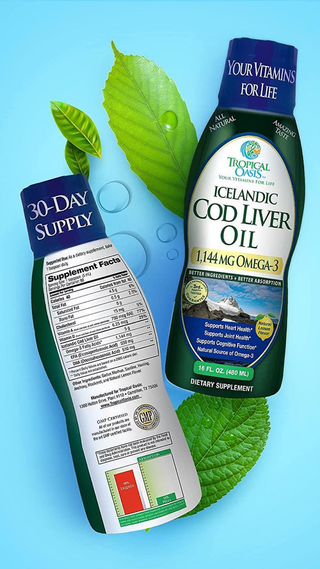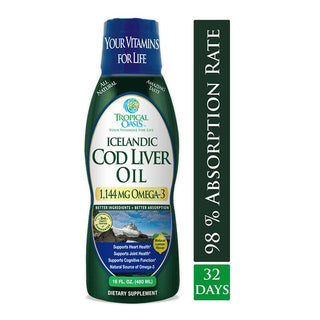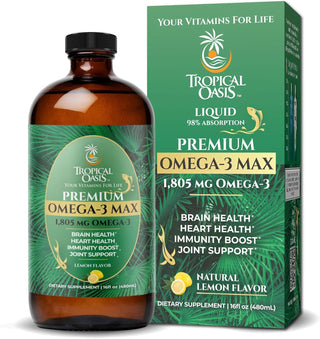Fish Oil For Men
At Tropical Oasis, we pride ourselves on offering top-quality liquid supplements that are easy to use and deliver the nutrients your body needs. With more than 20 years in the supplement industry, we've earned a reputation for providing products that truly work.
You’re viewing 1-2 of 2 products
Key Takeaways:
- Comprehensive Health Benefits: Fish oil supports heart, brain, joint, and muscle health, making it a valuable supplement for men’s overall wellness.
- Dietary Integration: Incorporating fish oil into your diet is simple and effective.
- Safety And Quality: Choosing the right fish oil supplement ensures you gain benefits without the risks associated with contaminants or improper dosage.
Why Fish Oil Is Important For Men
As men age, they face increased risks of cardiovascular disease, cognitive decline, and joint issues. The omega-3 fatty acids found in fish oil can help mitigate these risks by promoting heart health, supporting brain function, and reducing inflammation in the joints.
Additionally, fish oil may aid in muscle recovery and performance, which is beneficial for men who are active or engaged in regular physical exercise. Incorporating fish oil into a man's diet can therefore be a proactive step toward maintaining overall health and longevity.
Health Benefits Of Fish Oil For Men
Fish oil offers a wide range of health benefits for men, making it a valuable addition to a balanced diet. Here are some of the key benefits:
Heart Health
Fish oil is renowned for its positive effects on cardiovascular health. Omega-3 fatty acids, particularly EPA and DHA, help reduce triglyceride levels, lower blood pressure and decrease the risk of heart disease. These fatty acids work by reducing inflammation, improving the flexibility of blood vessels, and preventing the formation of dangerous blood clots. For men, who are generally at a higher risk of heart issues as they age, incorporating fish oil into their diet can be an effective strategy for maintaining a healthy heart.
Cognitive Function
Omega-3 fatty acids are crucial for brain health, and studies suggest that fish oil can support cognitive function, enhance memory, and even reduce the risk of neurodegenerative diseases like Alzheimer's. The DHA component of omega-3s is particularly important for maintaining the structure and function of brain cells, supporting neurotransmitter function, and reducing oxidative stress. For men, particularly as they age, maintaining cognitive health is essential, and fish oil provides a natural way to support brain function.
Joint Health
Fish oil has anti-inflammatory properties that can help reduce joint pain and stiffness, particularly in conditions like arthritis. The omega-3s in fish oil help to lower the production of inflammatory molecules and enzymes, such as prostaglandins, which can damage joints and lead to chronic pain. For men who are physically active or aging, maintaining joint health is crucial, and fish oil can play a significant role in reducing inflammation and promoting mobility.
Muscle Recovery
For men who engage in regular exercise, fish oil can aid in muscle recovery by reducing inflammation and promoting faster healing of muscle tissues. Omega-3s help decrease muscle soreness and improve overall muscle function, making it easier for men to stay active and achieve their fitness goals. The anti-inflammatory effects of fish oil help to reduce exercise-induced muscle damage, allowing for quicker recovery and less downtime between workouts.

Choosing The Right Fish Oil Supplement
Selecting a high-quality fish oil supplement is crucial to ensure you’re getting the maximum benefits without unwanted contaminants. Here are some factors to consider when choosing the right fish oil supplement:
Purity And Potency
Look for fish oil supplements that are purified and tested for contaminants such as mercury, lead, and PCBs. The label should indicate that the product has been molecularly distilled or purified to remove these harmful substances. Additionally, check the potency by reviewing the amount of EPA and DHA per serving; higher concentrations are generally more effective.
Source Of Fish
The type of fish used to produce the oil can affect its quality. Supplements made from smaller fish like anchovies, sardines, or mackerel are often preferred because they tend to have lower levels of contaminants compared to larger fish. Some supplements also specify that the fish were sustainably sourced, which can be important for environmentally conscious consumers.
Form Of Fish Oil
Fish oil supplements come in different forms, including triglyceride, ethyl ester, and phospholipid forms. The triglyceride form is the most natural and is often better absorbed by the body, making it a popular choice. Ethyl ester forms, while more concentrated, might not be absorbed as well, but they are often more affordable.
Additional Ingredients
Some fish oil supplements contain additional ingredients, such as vitamins D and E, to enhance their benefits. If you’re looking for specific health outcomes, these fortified options might be worth considering. However, it’s essential to avoid supplements with unnecessary fillers, artificial colors, or flavors.
Taste And Smell
One of the common complaints about fish oil supplements is the fishy aftertaste or burps. Many high-quality brands now offer flavored or enteric-coated capsules that can help minimize these issues. Liquid fish oil is also an option, though some people find it more difficult to tolerate due to the taste.
Get Your Omega-3s With Tropical Oasis Cod Liver Oil
Tropical Oasis Premium Icelandic Cod Liver Oil (16oz) is a convenient way to enjoy the benefits of Omega-3s without the strong, fishy aftertaste. Packed with 1,143 mg of Omega-3, including essential EPA and DHA, this formula helps support heart, brain, and joint health while minimizing the dreaded fishy burps. Its versatility allows you to take it on its own or mix it into your favorite drink, smoothie, or recipe for a seamless addition to your daily routine.
Suggested use is simple—just shake well and take 1 oz (2 tablespoons) daily. Store it in a cool, dry place, and once opened, refrigerate to keep it fresh for up to six months. Enjoy the powerful benefits of Omega-3s without the overwhelming oceanic aftertaste!
How To Incorporate Fish Oil Into Your Diet
Incorporating fish oil into your diet can be simple and effective, whether through natural food sources or supplements. Here are some ways to do so:
Eating Fatty Fish
The most direct way to get fish oil is by consuming fatty fish like salmon, mackerel, sardines, and tuna. These fish are rich in omega-3 fatty acids, particularly EPA and DHA, which are essential for various bodily functions, including heart and brain health. Incorporating these fish into your meals a few times a week not only boosts your omega-3 intake but also provides high-quality protein and other vital nutrients like vitamin D and selenium. Grilling, baking, or steaming these fish helps preserve their nutritional value, ensuring you get the maximum benefits without adding unhealthy fats or calories.
Fish Oil Supplements
If you find it challenging to consume enough fish in your diet, fish oil supplements are a convenient alternative that ensures you still receive an adequate amount of omega-3s. Available in liquid, capsule, or soft gel forms, these supplements provide a concentrated dose of EPA and DHA, making it easier to meet your daily requirements, especially if you have dietary restrictions or a busy lifestyle. It's essential to choose high-quality supplements that have been tested for purity and potency to avoid contaminants like mercury and ensure you are getting the full benefits.
Fortified Foods
Some foods, such as eggs, milk, and yogurt, are fortified with omega-3s, including DHA and EPA, offering an easy way to increase your intake without relying solely on fish or supplements. These fortified foods are particularly useful for those who may not enjoy the taste of fish or have dietary restrictions that limit their fish consumption. Incorporating these foods into your diet can help boost your omega-3 intake while also providing additional nutrients like calcium, protein, and vitamins, making them a well-rounded addition to your meals.
Cooking With Omega-3 Rich Oils
While not as rich in EPA and DHA as fish oil, cooking with oils like flaxseed, walnut, or canola oil can provide additional omega-3s in the form of ALA (alpha-linolenic acid), which the body can partially convert into EPA and DHA. These oils can be used in salad dressings, smoothies, or as a drizzle over dishes to enhance their nutritional profile without the need for high heat, which can degrade the omega-3 content.
Recommended Dosage And Safety Considerations
When it comes to taking fish oil, it's important to follow recommended dosages to maximize benefits and avoid potential side effects. The appropriate dosage can vary based on individual health needs, age, and dietary habits. Here’s what you need to know:
High-Dose Recommendations
For men with specific health conditions, such as high triglycerides or joint inflammation, higher doses of fish oil (up to 2 to 4 grams per day) might be suggested to achieve therapeutic benefits. These higher doses should be taken under the guidance of a healthcare provider, as they can affect blood clotting and interact with certain medications, particularly anticoagulants. Monitoring by a healthcare professional is crucial to ensure that the benefits outweigh any potential risks and to adjust the dosage as needed based on individual response and health status.
Interactions With Medications
Men taking blood-thinning medications or those with bleeding disorders should consult their healthcare provider before starting fish oil supplements, as omega-3s can enhance the effects of these medications and increase the risk of bleeding. It's essential to have a healthcare provider monitor any potential interactions and adjust dosages accordingly to maintain a safe balance between the benefits of omega-3s and the effects of other medications. This is particularly important for individuals undergoing surgery or those with a history of clotting disorders.
Read also:
- Top Vitamins That Boost Your Energy Levels Naturally
- Organic Vitamins: Everything You Need to Know for Better Health
- Understanding B12 and B Complex: Differences and Benefits
Sources:
- Contributors, W. E. (n.d.). Are There Health Benefits to Taking Fish Oil? WebMD. https://www.webmd.com/diet/health-benefits-fish-oil
- WebMd. (2019). Fish Oil: Uses, Side Effects, Interactions, Dosage, and Warning. Webmd.com. https://www.webmd.com/vitamins/ai/ingredientmono-993/fish-oil
- Jensen, T. K., Priskorn, L., Holmboe, S. A., Nassan, F. L., Andersson, A.-M., Dalgård, C., Petersen, J. H., Chavarro, J. E., & Jørgensen, N. (2020). Associations of Fish Oil Supplement Use With Testicular Function in Young Men. JAMA Network Open, 3(1), e1919462–e1919462. https://doi.org/10.1001/jamanetworkopen.2019.19462
- Sherrell, Z. (2021, March 8). What to know about the benefits of fish oil for men. Medicalnewstoday.com; Medical News Today. https://www.medicalnewstoday.com/articles/fish-oil-for-men
Frequently Asked Questions
The best time to take fish oil supplements is with meals, particularly those that contain fat, as this can enhance the absorption of omega-3 fatty acids. Many people prefer to take it with breakfast or dinner to avoid fishy burps that may occur on an empty stomach.
Yes, studies suggest that omega-3 fatty acids in fish oil can improve sperm quality, including motility and morphology, which are important factors in male fertility. However, more research is needed to fully understand its effects on fertility.
Fish oil supplements themselves are not associated with weight gain. In fact, some studies suggest that omega-3 fatty acids may help with fat metabolism and weight management when combined with a healthy diet and exercise.
Yes, fish oil's anti-inflammatory properties can benefit skin health by reducing the symptoms of conditions like acne, eczema, and psoriasis. Omega-3s help maintain the skin’s lipid barrier, keeping it hydrated and reducing inflammation.
The time it takes to see the benefits of fish oil can vary. Some effects, like reduced inflammation or improved cognitive function, may be noticed within a few weeks, while other benefits, such as improved heart health, may take a few months of consistent use.
While fish oil supplements generally offer the same benefits to both men and women, some products are marketed specifically towards men, often with added ingredients like vitamins D3 or K2 that target male health concerns.


